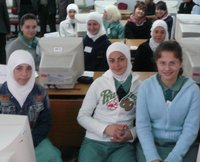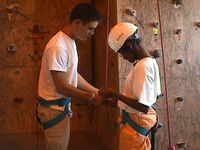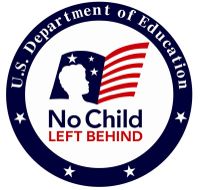I’m writing this post from Amman Jordan, where I’ve been visiting family and seeing the sights. In addition, I took some time for professional contacts to learn more about education in this part of the world.
My visit coincided with the 4th Annual Arab Forum on Education held in Amman. Many speakers saw educational reform as important factor in addressing the high (15 – 20%) unemployment rates in Arab countries. Jordanian Prime Minister Marouf Bakhit noted that “improving the quality of education requires … clear evaluation standards, adopting self-learning and creative programs instead of rote learning methods.” Jordanian Prince Hassan said that “democracy and development could only succeed with a foundation in modern learning and the encouragement of creative thought.” He added that “schools should be more than mere teaching factories – supportive environments catering for the needs of individual students.” Jordanian Times 4.25.07
While traditional instruction in Jordan had been largely confined to teacher-centered lectures, the country has now embraced a new direction with its “ERfKE Initiative” – Educational Reform for the Knowledge Economy. Jordan’s Ministry of Education is making a major commitment to reform their schools to support student development in critical thinking, problem-solving and the “soft skills” needed for success in the new information economy. It seems Jordan is moving in a different direction than the US, where NCLB dictates that the routine drudgery of test prep is more important than fostering student innovation through project-based learning.
I’d like to thank my two primary contacts who both took time to meet with me – Khitam Ahmad Al-Utaibi, the Youth, Technology and Careers Operation Manager for ESP (the ERfKE Support Project) and Maha AlShaer, Project Management Specialist / Education from the US Agency for International Development.
 I feel most fortunate to have been able to visit the Ein Jaloot Secondary School for Girls. (Click photo to enlarge.) I would like to thank headmistress, Thamar Yousef AlSoudi, for being a gracious host. Her school of about 700 high school students is one of the pilot sites for Jordan’s new “major” in Management of Information Stream (MIS). With USAID and corporate support, the Jordanian Ministry of Education has developed an online curriculum and web portal called EduWave. I got to see it in action in a class held in a computer lab. It was rather crowded by US standards – average classes are 40-45 girls in a room that was about 20′ x 30′. The teacher projected the online material via LCD. Flash files were used to illustrate the sectors of the Jordanian economy. As the teacher posed questions, every student seemed to be ready with an answer. I asked Maha if the girls where giving back “canned’ responses. She assured me that they were answering “in their own words” and that many of the comments were “personal opinion.” I was pleased to see the teacher wasn‘t just playing “guess what I’m thinking?”
I feel most fortunate to have been able to visit the Ein Jaloot Secondary School for Girls. (Click photo to enlarge.) I would like to thank headmistress, Thamar Yousef AlSoudi, for being a gracious host. Her school of about 700 high school students is one of the pilot sites for Jordan’s new “major” in Management of Information Stream (MIS). With USAID and corporate support, the Jordanian Ministry of Education has developed an online curriculum and web portal called EduWave. I got to see it in action in a class held in a computer lab. It was rather crowded by US standards – average classes are 40-45 girls in a room that was about 20′ x 30′. The teacher projected the online material via LCD. Flash files were used to illustrate the sectors of the Jordanian economy. As the teacher posed questions, every student seemed to be ready with an answer. I asked Maha if the girls where giving back “canned’ responses. She assured me that they were answering “in their own words” and that many of the comments were “personal opinion.” I was pleased to see the teacher wasn‘t just playing “guess what I’m thinking?”
Next, small groups of students took turns in role-play exercises. One scenario involved the owner of small shop explaining aspects of inventory management to a new employee. A second featured an unemployed engineering grad that started a computer repair business. I queried the teacher about the girl’s preparation for the role play. She assured me that while she provided the scenarios, the students had to research and develop their roles and dialogue.
What happened next was a welcomed surprise. Students broke into pairs and were asked to reflect on what they learned from the lesson and role-play exercises. They worked online in the EduWave portal, recording their comments in their network profiles. I was told that EduWave provides full suite of student, teacher and administrative tools including a portfolio builder, online assessments, and access for student and parents from home. Since it’s in Arabic, I couldn’t evaluate the material or interface.
My visit is far too brief to pass judgment on the education reform in Jordan. But I was pleased to see the direction in which it is moving. The teacher I met told me about how pleased she was to be able to be part of this new program. Instead of teaching a rather dull keyboarding class she was now utilizing new technologies alongside her students in a more dynamic learning environment. Ironically too many of her teaching peers in the US no longer find their careers as rewarding. Once a beacon of innovative instruction, we are stifling American teachers as we chase an illusive “adequate yearly progress.”
Jordan is a country surrounded by turmoil and conflict. Nonetheless the educational leadership appears to be sincere in their efforts to modernize and prepare there students to be productive members of the new global economy. But one observation brought home the challenges of reform in a tradition-steeped culture. As Maha translated the girls’ dialogue during the role-playing, she repeated used the word “he.” Finally, I asked her if girls were role playing as men. She smiled and admitted all the parts the girls had taken were male. As she put it, girls would find it “awkward” to participate in a role play “as themselves.”
Like this:
Like Loading...
 One question posed by a teacher captured a central challenge to education in the 21st century – “How do I put students in charge of thinking in my classroom?”
One question posed by a teacher captured a central challenge to education in the 21st century – “How do I put students in charge of thinking in my classroom?”





